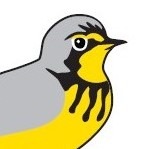
Adamo family Photo: BSC
When competition for nesting habitat is fierce or predators reduce nesting success, moving to a different beach may be the only option for a Piping Plover. However, development has made many public and private beaches unsuitable nesting habitat for this endangered species.
Fortunately, cottagers can be the birds’ best advocates – and many are eager to take on that role. Volunteers with Bird Studies Canada’s Piping Plover Conservation Program in Nova Scotia and New Brunswick monitor breeding Piping Plovers and act as stewards to reduce threats and disturbance to the birds on beaches.
In June 2016, Shelley Adamo called us to report a pair of plovers on a beach in front of their cottage near Port Joli, Nova Scotia. This was especially exciting news to us, because it was the first time nesting plovers had been reported at this site! Enthusiastic about the newcomers, the Adamos were happy to give the plovers space on the beach to settle down and build a nest.
With two rental cottages on the beach and groups of renters coming and going, we decided to use signs and rope fencing to protect the nest from trampling and disturbance. The renters were respectful, and a few helped us monitor the plovers. All three eggs hatched on July 20, 2016, with two chicks ultimately surviving to fledge and take flight.
One family sharing space on the beach with another is an example of the small, but important, steps that make the difference in conservation, and give us all hope on the long road to recovering Piping Plovers. It’s wonderful to see kids and families become champions for these birds. See for yourself in this inspiring video by program supporter Environment and Climate Change Canada!
We invite you to discover more about Bird Studies Canada’s Piping Plover conservation work, and opportunities to volunteer, in our latest Beachbird newsletter.

